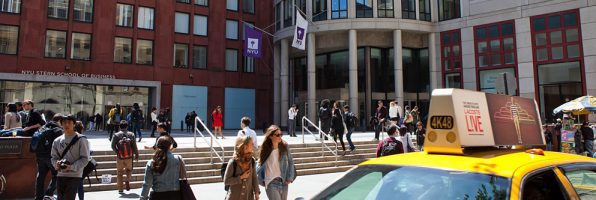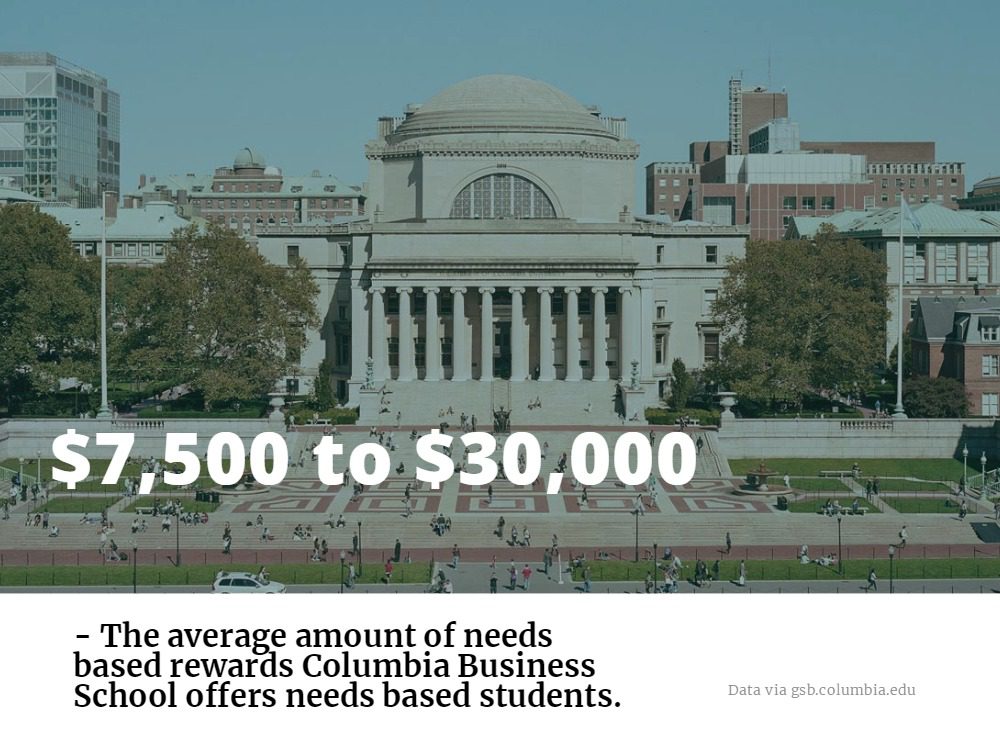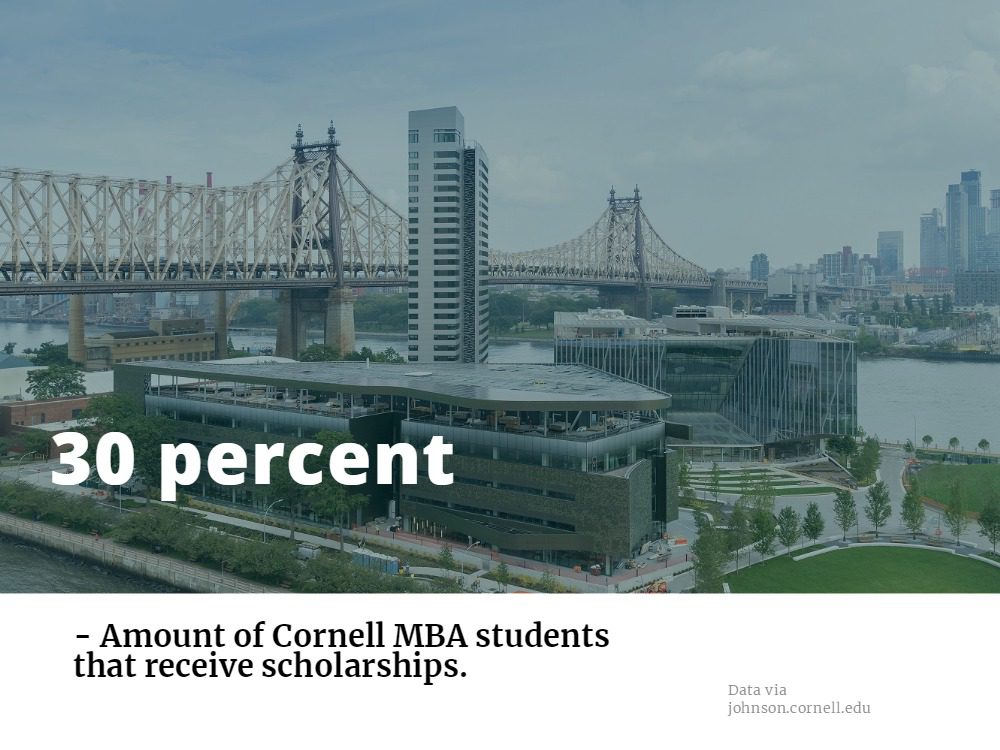Vincent Kompany: International Footballer and MBA All-Star

When it comes to soccer (err, football) Manchester City captain Vincent Kompany is one of the most widely known centre backs in the world. The Belgian international joined City way back in 2006 and went on to lead his club to victory, helping bring the team its first Premier League title in over four decades in 2012, and then again in 2014.
How NYC Business Schools Help the Underprivileged Applicants

Pursuing an MBA is a shrewd move for anyone looking to earn a competitive salary right out of school. Though attending a renowned school can up the price tag of earning an MBA, it may also increase the overall return on investment. According to an article in U.S. News & World Report, “… graduates of top-tier business schools usually earn higher starting salaries than their peers who went to lower-ranked schools.”
It’s not jut the opportunity to have a lucrative job right out of school that makes a high starting salary appealing. An enviable starting salary could mean more earning potential down the line. However, a top-tier school may seem out of reach for low-income applicants. After all, how can you enjoy the return on investment if you can’t afford to invest in the first place?
Luckily, many prestigious business schools offer resources for students from different socioeconomic backgrounds. Below, we’ve outlined the resources available for low-income applicants at five of New York City metro’s best business schools.
How NYC Business Schools Help the Underprivileged
Columbia Business School
Columbia Business School offers need-based awards to many students, which may result in anywhere from $7,500 to $30,000 in tuition support. Nearly half of applicants receive need-based scholarships, which are automatically renewed at the start of the second year. Columbia students can also apply for private and federal loans. To create incentive for students to choose careers in public and nonprofit fields, the school offers a Loan Assistance Program for students who utilize their education to pursue these paths. Students are eligible to apply for this program for up to five years after graduation. Depending on the extent of students’ debt, they may receive anywhere from $2,000 to $10,000 of annual support. Columbia students may also receive merit-based scholarships, such as the Columbia Fellows Program, which may cover full or partial tuition and is granted to applicants with an outstanding track record in leadership and creativity.

Stern School of Business—New York University
NYU’s Stern School of Business offers a variety of scholarships for high-achieving applicants. According to the school’s website, nearly a quarter of students who enter the full-time MBA program receive a merit-based scholarship. There are also additional merit-based opportunities for students coming from different backgrounds and perspectives. Scholarships like the Advancing Women in Business Scholarship and the Forte Fellowship are particularly geared toward female-identifying students, to support women in business. The ROMBA Fellowship aims to help LGBTQ students succeed in business education. The Consortium Fellowship exists to increase the number of minorities such as Hispanic Americans, Native Americans, and African Americans in business school as well.
Gabelli School of Business—Fordham University
At the Fordham University Gabelli School of Business, graduate students may be eligible for federal financial aid, merit scholarships, or a variety of graduate assistantships. Awards based on academic excellence range from $10,000 to full tuition. Exceptional students may be eligible for awards like the Dean’s Premier Scholarship, which includes a $20,000 living stipend, and may include a stipend toward one of Fordham’s global programs. Students can also apply for a plethora of need/merit-based scholarships, like the Hitachi Diversity and Inclusion Scholarship, which seeks to help underrepresented minorities finance their education.
Rutgers Business School, Newark and New Brunswick
The Financial Times ranked Rutgers Business School among the top 50 MBA programs for return on investment in 2017, citing a 130 percent increase in salary for students within three years of completing their degree. Moreover, the school’s website states that, “More than 80 percent of Rutgers students receive some form of financial aid.” Moreover, at $31,011 per year (not including fees), this program is far more affordable than many other prestigious schools. Students can apply for federal or private loans, grants, and an array of scholarships. In addition to the awards offered by the Rutgers Business School Graduate Scholarship Fund, the Rutgers website lists 30 fellowships, scholarships, and partnerships. The Ralph Bunche Fellowships, for example, provide tuition remission, and a $15,000 living stipend to minority students from disadvantaged socioeconomic backgrounds.
SC Johnson Graduate School of Management—Cornell University
Around 30 percent of entering the SC Johnson Graduate School of Management students receive some level of scholarship support. Scholarships like the National Society of Hispanic MBA’s (NSHMBA) and the TOIGO Fellowship specifically seek to help underrepresented minorities. The MD MBA Dual Degree Program and Lee Family Scholarship supports students on the rigorous path to receive their MD/MBA. Additionally, Cornell’s Park Leadership Fellows Program awards full tuition to up to 25 MBA applicants annually. The award is granted based on personal and professional achievements, academic performance, social contributions, and leadership. Students can also apply for federal and private loans.

Georgetown Jumps in Newest Financial Times Global MBA Ranking

Georgetown was one of the bigger winners after the Financial Times unveiled their newest Global MBA Rankings, with the McDonough School of Business earning 16th place in the U.S. and 30th in the world, up from 18th and 40th last year.
To create their rankings, FT evaluated each qualifying MBA program across a wide range of criteria. Much of the data is gathered from alumni and university surveys. According to McDonough, this year’s survey was completed by the class of 2014, which was the first cohort to complete the new school’s new MBA curriculum.
“As a school that prides itself on innovation and excellence, we are pleased to continue climbing in the Financial Times MBA ranking,” said Prashant Malaviya, senior associate dean for MBA programs. “At McDonough, we prepare our students to be principled, global-ready leaders, and we are happy to be recognized by a ranking that values international experiences, career success, and faculty scholarship.”
In addition to alumni data, FT takes the international character and diversity of the school into account for their list. McDonough’s 42-place jump in the International Experience Rank (4th in the U.S.) contributed to high marks in those criteria, as did the required Global Business Experience consulting project and the growing number of international career treks. The school’s faculty research rank is now 19th in the world, up 10 places from last year.
The Financial Times publishes seven rankings annually, relating to MBA, EMBA, Master in Finance, Master in Management programs and Online MBA programs, as well as non-degree executive education courses. They also issue a separate ranking of top European Business Schools. Check out FT’s interactive rankings tables to search for a school of interest, sort by selected criteria and filter by location.
Read more about this year’s FT rankings in our recent spotlight, courtesy of Clear Admit.
Stanford Reigns Supreme on New Financial Times Global Ranking

INSEAD hoped to top the Financial Times MBA rankings for the third year in a row, but it wasn’t to be. The Stanford Graduate School of Business (GSB) gets top bragging rights this year, returning to the number-one spot it has held only once before, in 2012. INSEAD was knocked to number two, followed by the University of Pennsylvania’s Wharton School, which held steady at number three. London Business School (LBS) reclaimed some ground this year—coming in fourth—after a rare fall last year out of the top five. Harvard Business School (HBS), meanwhile, ranked fifth, its lowest showing since 2008.
Rounding out the top 10 this year were the University of Chicago Booth School of Business at sixth (up from ninth last year); Columbia Business School at seventh (unchanged from 2017); China’s CEIBS at eighth (up from 11th); MIT Sloan School of Management at ninth (up from 13th); and UC Berkeley’s Haas School of Business at 10th, (also up from 13th).
Perhaps the greatest victors of this year’s FT rankings were two-year MBA programs, which occupied nine out of the top 10 spots. More two-year programs moved up or maintained their position this year than moved down (31 compared to 21). In contrast, more one-year programs lost ground than gained this year (14 up, 21 down).
“It’s great to see the continued strength of the two-year MBA format in this year’s FT rankings, a format that allows for a truly transformational and immersive experience,” said Clear Admit Co-Founder Graham Richmond. “LBS’s move back into the top five isn’t surprising in light of the program’s continued strength in job placements, new facilities, curriculum redesign, and location at the heart of business and innovation in Europe (even as Brexit looms),” he continued. “While HBS’s position is inconsistent with Clear Admit’s Decision Wire-based data on applicant preferences, it’s the increasing gap in the FT ranking between Stanford and HBS that seems noteworthy.”
As always, the bearing a given ranking should have on your own choice of schools depends on how closely the methodology used to arrive at that ranking aligns with what you deem most important. So just how does the FT compile its list each year?
Understanding the FT Ranking Methodology
The FT ranking is based on surveys of alumni three years out from graduation, school data, and research rank. Alumni responses inform eight criteria—including average income three years after graduation and salary increase compared with pre-MBA salary. Together, these eight criteria account for 59 percent of the overall ranking. School data inform another 11 criteria—including various measures of diversity such as percentages of female and international faculty, students, and board members. Together these criteria make up another 31 percent of the ranking. The remaining 10 percent of the ranking is based on research rank, calculated according to the number of articles by full-time faculty in 50 internationally recognized journals, weighted relative to faculty size.
Record-Breaking Salaries Put Stanford GSB on Top
Stanford, which ranked second last year, managed to unseat INSEAD this year thanks in part to the record-breaking salaries reported by its alumni. The average Stanford alumnus salary three years after graduation was $214,742, up $20,000 over last year’s figures and the highest recorded since the inaugural FT ranking in 1999. Stanford grads’ average salary also represented a 114-percent gain on their pre-MBA salaries, also the highest increase among ranked schools. That a significant proportion of Stanford grads head into highly lucrative hedge fund positions helped it outdistance its rivals in this regard.
Stanford also far outdistanced its U.S. rivals in terms of the international exposure it affords its students. More than 25 percent of the latest graduating cohort did an internship abroad—compared to an average of 4 percent at ranked U.S. schools. Overall, though, Stanford ranked 32nd for international course exposure, down 14 places from last year. But in other measures of diversity, Stanford made gains, including its international faculty (41 percent), international board (25 percent), and international students (41 percent). In this last figure, too, Stanford set itself apart from its U.S. rivals, the majority of which have recruited fewer international students. Although the average proportion for ranked institutions is down by only one percentage point to 38 percent, the FT noted.
Research Scores Hold HBS, LBS Back
Both HBS and LBS saw their average salaries three years out increase by approximately $14,000—to $192,133 and $167,897 respectively. That climb helped LBS return to the top five this year, but sharp drops in each schools’ research ranks worked against them. Harvard’s research rank plummeted from third to 16th—contributing to its fall to fifth in the overall ranking. “This year’s research rank is based on articles published in 50 academic and practitioner journals by full-time faculty since January 2015, but several Harvard faculty last appeared in these publications in 2014, too long ago to count,” the FT noted. LBS, for its part, dropped from 12th to 27th in research rank.
Rice Business, Olin, Georgetown McDonough, Cornell Johnson See Big Gains
Just as two-year MBA programs fared well with regard to their one-year rivals this year, a select group of individual schools saw big gains this year over last. Rice University’s Jones School of Business jumped 19 places this year, from 64th to 45th. This surge can be attributed primarily to strong salary growth. Average salary grew from $130,189 to $139,189, contributing to a 118-percent increase over pre-MBA salary (up from 97 percent last year).
Washington University’s Olin Business School rose 18 spots, from 68th to 50th. The St. Louis school saw significant gains in average salary ($122,709) and increase over pre-MBA salary (107 percent). Georgetown University’s McDonough School of Business jumped 10 spots, from 40th to 30th, thanks also in part to increased average salary, as well as improved research rank (up 10 spots to 17th) and various diversity measures. And Cornell University’s Johnson Graduate School of Management also moved 10 spots up in the ranks, from 27th to 17th, due in great part to a significant increase in its research rank, up 13 places to fourth overall.
Spain’s Schools Slip Out of Top 10
In less celebratory news, two of Spain’s top-tier business schools slid out of the FT’s upper-most ranks. IESE slipped from 10th to 11th. Though its graduates’ average salary increased year over year, the increase was slight. Moreover, it slipped seven spots in terms of percentage increase over pre-MBA salary. Research rank, too, fell by five spots over the previous year.
IE Business School, meanwhile, fell out of the ranking altogether—from eighth last year. This is because it couldn’t gather a representative sample of the school’s alumni to take part in the FT’s survey.
As always, those of us here at Clear Admit encourage prospective applicants to use a school’s performance in these and other rankings as just one of many measurements to determine the MBA program that will best fit your individual needs.
You can view the complete Financial Times 2018 Global MBA Rankings here.
This article has been edited and republished with admissions from our sister site, Clear Admit.
Why Amazon Keeps Hiring MBAs

Editors Note: This article on Amazon hiring MBA students is an updated version of the original.
When thinking about the largest tech sector companies in the world, Apple, Microsoft, Facebook, Google, and Amazon are sure to top the list. Not only are these companies on the forefront of technological advancement in business and consumer electronics, they are also major players in the MBA job market.
Of all these notable heavyweights, Amazon is the biggest employer of graduates from elite business schools. According to the U.S. News & World Report’s top 20 rankings (from schools that release company-level hiring statistics), the e-commerce powerhouse hired more than twice as many top MBAs in 2016 as Microsoft, the next biggest tech employer. And with the upcoming development of HQ2, the company’s second headquarters, demand for MBA-level talent is sure to increase at the ever-expanding ecommerce giant.
Amazon—a company that offers online retail, cloud computing, mobile devices and media streaming services—has plenty of workforce needs. According to its annual report, Amazon has 230,800 full- and part-time employees. According to QZ, the company currently lists almost 17,000 open jobs among its corporate positions.
Why Is Amazon Hiring MBA Students?
Across all industries, Amazon is the fifth-largest employer of graduating MBAs, according to data on more than 200 full-time MBA programs collected by Bloomberg Businessweek. Amazon is also No. 4 on the 2013 Universum list of most popular MBA employers, up from No. 8 in 2011 and No. 6 in 2012.
Why the focus on hiring top MBA talent? Miriam Park, director of university programs at Amazon, told the Financial Times:

Miriam Park
“The Amazon recruitment process is designed to ensure we hire top candidates with high-growth potential whatever their background may be. As part of this we recruit current MBA students and MBA alumni for permanent and internship opportunities worldwide and see MBAs as an important part of our leadership development. We value people who can balance long-term strategic thinking with tactical execution, and who have the ability to make data-driven decisions.”
She added:
“We value MBAs for, in many cases, the global approach that they can bring to the business with many candidates having worked and studied in more than one country. Their range of experience and variety of backgrounds is invaluable in bringing a different way of looking at our business. We also value the analytical skills that they develop through their MBA. In fact, many of our senior leaders started at Amazon after completing MBAs.”
Which Potential Paths Leads to Employment at Amazon?
The best way that an MBA can get in with Amazon and end up with a job is to apply for an internship. Amazon also offers an MBA program that intends to create a pipeline from top business schools to actual jobs within the organization. Amazon offers several full-time opportunities to MBA interns. Each role lasts 11 to 12 weeks and provides students the opportunity to complete function-specific projects.
The company also offers a robust 8 to 12-week summer MBA internship that gives participants the opportunity to hone their decision-making ability in real-life consumer, finance, HR, technology businesses and operations environments. According to CNNMoney, Amazon’s summer internships host more than 170 interns from more than two dozen business schools each year.
What Kind of Jobs Can I Get at Amazon with an MBA?
As CNNMoney outlines, MBAs at Amazon may end up in any number of roles, whether it’s launching new products, finding ways to optimize the customer experience or evaluating the company’s future business investments.
Park discussed specific jobs that are offered to MBAs with the Financial Times. In terms of potential career options for MBAs at Amazon, she outlined participation in the Consumer Leadership Development (CLD) program, Pathways program for operations managers and Senior Financial Analyst (SFA) development program, as well as the role of senior product manager.
CLD is a three-year leadership development program in which MBAs rotate through two different roles from a choice of areas such as vendor management, in-stock management, marketing management, merchant management and/or retail product management. The goal of the program is to provide MBAs with a path to leadership roles at Amazon. Participants develop an understanding of the key roles within retail and become effective managers.
Pathways is a three-year, field-based program based out of warehousing and shipping centers for merchant goods and customer service sites. This is a position in which MBAs will have to develop leadership ability to complete fulfillment center and customer service operations.
SFA is a three-year leadership development program in which senior financial analysts are expected to evaluate and quantify new business ideas and perform data-intensive analyses to improve the way Amazon serves its customers.
Senior product managers work with technology teams to drive ideas from conception to execution, develop business models and marketing plans, define and analyze success metrics, manage strategic projects and own the product end to end. This job offers an inside track to future roles as general managers responsible for running large business segments.
More Harvard MBAs Are Turning to Politics

There’s no doubt that politics and public service have been hot topics since the November 2016 election. These subjects have dominated news stories and talk shows across the country. And, according to a recent report by the Wall Street Journal, politics and public service are also moving up as career choices for graduates from Harvard Business School (HBS).
Around 40 Class of ’17 HBS MBA graduates launched careers in government and nonprofits—twice as many as the previous year. Even though this represents just 4 percent of the program’s 900 graduates, it still suggests a growing interest in policy-making for business students.
Of course, business and government have always been closely connected, and it’s common for MBA students to aspire to public service and nonprofit involvement as part of their long-term career plans. The difference is that MBA graduates are starting to head into public service careers immediately after graduation. At least that’s what Matthew M. Segneri, an HBS MBA Class of 2004 alumnus, has witnessed.
Segneri, the director of the Social Enterprise Initiative at HBS, has noticed that graduates are increasingly considering careers in politics. In an article in the Harvard Crimson, he said: “Over the last 12 to 18 months, I’ve had a number of conversations with folks and seen a real uptick in the number of people who are thinking about local, state, and federal office.”
He went on to observe a change in the timing of these plans. “When you look at the prior generations of alumni there is more the tradition of learn, earn, and return—folks would go to school, have a successful traditional business career, and then later in life they would pursue public office or get deeply engaged in nonprofits and their communities,” Segneri said. “Today, there’s both an urgency and an understanding that it doesn’t have to be that way.”
There are many factors driving the surge in interest in politics. One is the simple fact that the United States elected a prominent businessman as president in the last election. Another is a trend of prominent business leaders being very vocal about politics in recent months, reinforcing the connection between the business and political realms.
For example, during the 2016 November election, Meg Whitman, the CEO of Hewlett Packard Enterprise Co., threw her support behind the Democratic candidate in New Jersey’s Fifth Congressional District race. And Carlos Diaz, a French entrepreneur in Silicon Valley, told the Financial Times that the tech industry has some responsibility for the 2016 election outcome.
YOU MAY ALSO LIKE: MBA Alumni Spotlight: HP CEO Meg Whitman
“The America that voted for Trump does not own a Tesla, nor an iPhone, and when it needs money, it does not ask business angels for help: it relies on bad credit,” Diaz said. “It is time to recognize that we need to develop technologies and businesses that will benefit the widest range of people possible, algorithms that do not divide but that bring together.”
So, it’s not a surprise that MBA graduates are heading into politics. In fact, more than a dozen Harvard MBA graduates have recently announced campaigns to run for local, state, or federal government.
Democrat Tim Keller, HBS MBA ’05, was elected mayor of Albuquerque, NM, last month while Republican Margaret Busse, HBS MBA ’01, recently announced her candidacy for the Massachusetts state senate. In addition, HBS MBA ’03 Sarah Amico is expected to announce her run for lieutenant governor in Georgia.
While Keller didn’t enter politics straight out of graduate business school, he understands why new MBA graduates are doing so. “In business school, what a lot of people do is say, ‘Oh, my second career is gonna be in public service. I’m gonna go into business, be successful, and then do public service,’” he told the Crimson. “What’s different all of a sudden is that people are opting out early, and they’re like ‘I’m gonna do this right now’ because they’re upset about something or fired up and want to make a difference.”
Adem T. Bunkeddeko, MBA Class of ’17, is currently running for Congress in New York’s Ninth Congressional District in Brooklyn—making him a perfect example of this phenomenon. Throughout his career at Harvard, Bunkeddeko maintained his connection to his local community and decided to use his business skills to better serve through politics. “At HBS we’re trained as general managers,” he said. “Understanding aspects of an organization, whether it be from the finance front or human capital, are important and useful skills that are actually quite lacking in public service today.”
And many other MBA graduates feel the same way. For Busse, who is running for the Massachusetts State Senate, the many case studies she read during her HBS coursework informed her desire to go into politics. “It’s really that ability to solve real-world problems that is needed in government today, that is needed in nonprofits today, and anywhere where people are trying to make a difference,” she said.
In addition, Busse sees widespread dissatisfaction with the current political climate as another reason MBA graduates are entering this arena. “I’m guessing a lot of people are feeling like me, frustrated with the current situation we have in politics today and feeling their skillset gives them a unique ability to help solve the problems we have right now,” Busse said.
In fact, that dissatisfaction led HBS MBA ’01 Daniella Ballou-Aares to recruit more HBS graduates into politics by forming the nonprofit Leadership Now with some of her fellow alumni. Developed after the 2016 election, Leadership Now recruits Harvard alumni and business leaders to run for office and helps to raise funds for their campaigns. After just a few months, the nonprofit already has the support of about 300 high-level business leaders.
Another example of HBS graduates encouraging public service is With Honor, which was developed by ’09 MBA Rye Barcott to support veterans running for office. In 2018, the organization plans to spend $30 million supporting campaigns for 25 to 35 congressional candidates.
In the end, Keller notes that the biggest motivation for MBAs to get into politics may be President Donald Trump. “Whether you like him or not, he is motivating. You’re either motivated against him or you’re motivated for him,” Keller said. “I also do think there’s just something about the millennial group that they’re not going to wait around.”
To learn more about how Harvard Business School facilitates students’ careers in politics, visit the school website.
